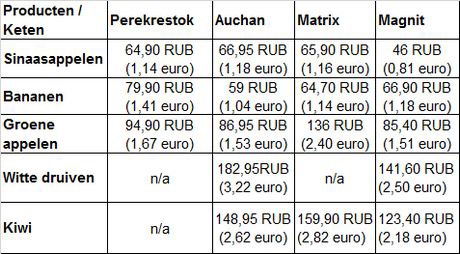The Russian phytosanitary started its visits to Greek companies. Russia stresses that no final decisions have yet been made regarding the future of the boycott. Agriculture Minister Tkachev aims for the country to achieve 90% self-sufficiency in 2 to 3 years. Turkey seems to be a victim of Russia's strict import requirements and its desire for self-sufficiency. Russian media published a price survey conducted at the large city of Samara. Ukraine has increased the import duty on food and industrial products and Moldova is in talks with Russia regarding the lifting of sanctions.
Russia inspects Greek companies
The Russian phytosanitary service around has started visiting Greek companies, mostly in the meat industry and fisheries. The aim is to see if the companies meet the requirements and may be authorised for export. Greek companies are eager to resume exports to Russia and the relationship between Greece and Europe is fragile. It is unclear what the consequences would be if Russia opened its borders to Greek products. Incidentally, Greece is not the only country that aims to improve its relations with Russia. Hungary and Cyprus are also flirting with Moscow.
Ambitious start new Minister of Agriculture
The new Russian Minister of Agriculture, Alexander Tkachev, aims for 90% self-sufficiency in food. According to Tkachev, this could be achieved in 2 to 3 years. Regarding the future of the boycott, Russia will wait until June before a decision is made, taking into account the volume of imports that is likely to be needed and what the EU plans to do about its sanctions against Russia. In June, a meeting of EU leaders will be held regarding this issue. "For now, the lifting of the embargo is not on the agenda. There are special requests from countries for specific products that are being considered, but no final decision has yet been made," said Deputy Prime Minister Arkady Dvorkovich.
Turkey victim of Russia's desire for self-sufficiency?
Turkish tomato exports suffer from Russia strict import requirements, reports Zaman. This year alone, 101 tonnes of Turkish tomatoes have been refused entry at the border, officially because of exceeded MRLs and pests. In Turkey, they wonder whether these rejected batches are sold on the local market, thus posing a threat to the Turkish public. Although the Russian authorities point out the risks to human health, there also other interests in play. Russian fruit and vegetable producer associations are pressing Moscow to further restrict imports. According to Turkish exporters, there have been no exceedances of residue levels, but the country's consumers still prefers the tomatoes to be checked by an independent organisation.
Moldova talks with Russia on trade
At a conference in St. Petersburg of the Interparliamentary Assembly of Member Nations of the Commonwealth of Independent States (IPA CIS), an alliance of former Soviet republics, Moldova and Russia discussed their trade relations. According to Moldova, its association agreement with the EU is not incompatible with its agreement with the CIS. "Russia could make good use of the advantages we get from the EU," said the Moldovan representative. The boycott on Moldovan fruit and vegetables was also discussed. "We consider Russia an important trading partner, but the boycott on fruits and vegetables is quite unfortunate for us. It is the main reason why our political relationship has suffered."
Russian plan for mushroom cultivation
In Russia, the Federation for Agricultural and Food Policy and Environmental Management received a proposal that could help the country become self-sufficient in the cultivation of mushrooms. According to the experts who prepared the proposal, $ 400 million are needed for the project. That's almost as much as the cost of importing; however, the investment would be quickly returned because of the high demand for the product, with Russian consumers annually buying about 110 tonnes of mushrooms.
Russia boycott potatoes Bangladesh
From 6 April, Russia stopped importing potatoes from Bangladesh because of the presence of brown rot, detected a few weeks ago. According to the Russian authorities, Bangladesh does not meet the necessary phytosanitary conditions; therefore, Russia will drastically reduce imports temporarily. It is not the first time that Russia closes the borders; Egypt and India have also been subject to such measures in the past.
Price Overview Russia
The Russian website progrodsamara.ru recently published a list of prices for various products in Russian supermarkets. The figures give an insight into the level of prices in the Samara, a metropolis about 1,000 kilometres east of Russia.

The site also published a summary of banana prices in recent months. It shows that the price since November 2014 has almost doubled.

EU promotion budget approved
The European Commission has approved 41 promotional campaigns for agricultural products with a total budget of 130 million Euro, half of which will come from EU funds. The budget also includes 30 million Euro intended for promotional purposes to tackle the effects of the Russian boycott. There are programmes from 18 Member States for the promotion of fruit and vegetables, meat and dairy. 17 of the campaigns focus on the European market, while the other 24 are intended for international promotion. Compared to the previous distribution of the budget, there has been a shift in focus from European to international markets. Target markets include the Middle East, North America, South East Asia, China, Japan, South Korea, Africa, Russia, Belarus, Kazakhstan, Australia and Norway.
Ukraine increases import duty
The Ukrainian Government has now increased the import duty on food by 10% and on industrial products by 5%. This is expected to yield $ 800 million extra for the treasury, after the war in the East has consumed much of the country's financial reserves. Moldova, which was already affected by the Russian boycott, has been hit hard by this measure.




